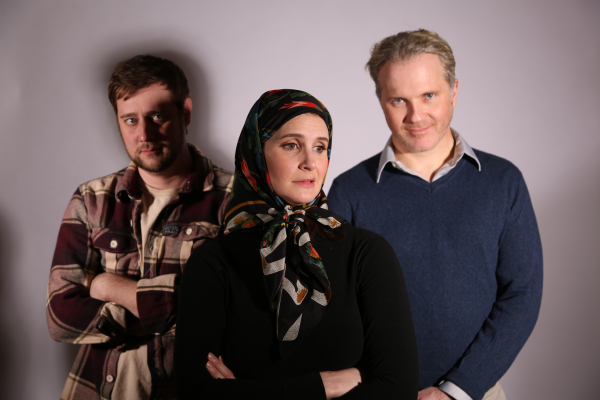The International

(© Michael Priest Photography)
The serenity of an art gallery is not the atmosphere you'd expect to find in a play that describes a horrific episode of war. But then the characters of Tim Ruddy's finely crafted play The International, now playing at The Cell, are, in a sense, three portraits for contemplation. Christopher Randolph directs this taut, visceral drama in an understated yet jolting production that gives us reason to reflect.
The play revolves around an attack on an Eastern-European village during an unnamed armed conflict reminiscent of the Bosnian War of 1992 to 1995. It's wartime, and Irene (Carey Van Driest), a gregarious, energetic farm woman with an infectious smile, is about to attend a wedding. Stationed nearby is Hans (Timothy Carter), a Dutch member of the International Army who never expected to find himself stationed in a theater of war. On the other side of the world in Los Angeles, unemployed artist Dave is having money and marital problems, both of which are exacerbated when his extended family drops in and plans a trip to Disneyland that he cannot afford.
When the village is attacked, Irene watches as the wedding party, the villagers, and her family members are murdered around her. Hans must stand by helplessly as the carnage begins, because Internationals are not permitted to intercede in armed conflicts without jumping through numerous administrative hoops. Meanwhile, Dave has been following the bloody event on CNN and has made a wager with members of his family about who's going to win. He has 800 bucks riding on the outcome; the villagers' defeat is the only way he's going to be able to afford a trip to Disneyland and save face with his wife. But there are no winners in war, not even if you're thousands of miles away, and each of the witnesses to this shared horror will suffer its effects in his or her own way.
For much of the play, the three actors remain in their own areas on the stage and narrate their stories to the audience as though speaking to a therapist. As Irene, Van Driest is positively galvanizing. She stands front and center, head covered in a black scarf, and speaks first with the joy of a contented wife and mother and then transforms into a bereft, despairing widow. Carter captures the infuriating frustration of Hans, whose hands are tied by bureaucracy and who must stand by and watch while innocent people are slaughtered. But the most chilling performance belongs to Ted Schneider, who seems uncomfortably familiar in his guy-next-door portrayal of the dissociated American Dave. While it's easy to condemn Dave for his arrogance and indifference to the suffering of the villagers, we recoil at the thought that we may, at times, share his apathy.
Director Randolph has masterfully overcome the potential pitfall of monotony in a play that contains relatively little physical action. Working with Ruddy's compelling script, he gradually creates a palpable sense of dread that increases until the three narratives converge, explode, and scatter like shrapnel. Derek Van Heel's lighting, which disperses unsettling shadows on the actors and the Jackson Pollock-inspired paintings of James Maloff's set, collides with Benjamin's Furiga's thunderous sound design and Ruddy's urgent language to create an miniature apocalypse onstage. The effect is as spellbinding as it is frightening. The production as a whole is a small, disturbing masterpiece, like a fine painting that provokes contemplation.










